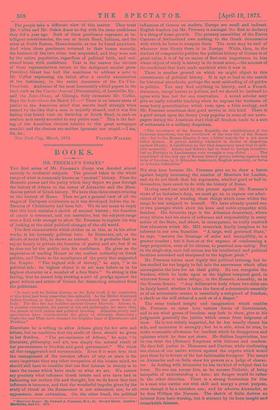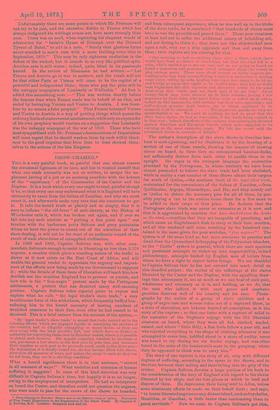BOOKS.
MR. FREEMAN'S ESSAYS.*
Tub; first series of Mr. Freeman's Essays was devoted almost entirely to mediaeval subjects. The present takes in the whole range of what is commonly known as "ancient" history. From the Homeric poems and the polity which they depict we pass through the history of Athens to the career of Alexander and the Mace- donian period of Greek history. We have then three essays relating to the history of Rome. Thus we get a general view of all the stages of European civilisation as it was developed before the in- fluences of Christianity had been felt. We do not mean to imply that this book contains a sketch of ancient history ; the function of essays is comment, and not narrative, but the subjects range over a field wide enough to allow Mr. Freeman to explain his way of looking at the chief political changes of the old world.
The first characteristic which strikes us in this, as in his other works, is his intensely political turn. In literature, art, or the details of social life, he shows no interest. It is probable that he enjoys keenly in private the beauties of poetry and art, but if so he does not let the public into his confidence. He gives us the impression of reading Homer as the earliest authority on Greek politics, and Dante as the mouthpiece of the party that supported the Empire. "The highest side of history," he says, " is its political side ; its highest object is to set man before us in his highest character as a member of a free State." So strong is this feeling, that he cannot help showing a sort of-grudge against the great writers and artists of Greece for distracting attention from the politicians.
It were well for Italian history, as for Italy itself, if its reputation of this kind had been somewhat less splendid. As the Medici destroyed Italian freedom, so their fame has overshadowed the purer fame of Italy. The like fate has befallen ancient Greece likewise. Athens is, in popular conception, the parent of art and philosophy, far more than the parent of civil justice and political freedom. Athenian poetry and speculation have overshadowed the glory of Athenian democracy ; Sophocles and Plato have dimmed the brighter fame of Kleisthenes and Perikles."
Elsewhere he is willing to allow Athens glory for her arts and letters, but on condition that the credit of them should be given to her freedom. "The pre-eminence of Athens," he says, "in literature, philosophy, and art, was simply the natural result of her pre-eminence in freedom and good government." We think all this exaggerated and unreasonable. Even if it were true that the management of the common affairs of city or state is far more important than any other occupation of the human mind, we should still have to consider that our first interest in history is to learn the causes which have made us what we are. We cannot say precisely what influence Greek letters and arts have had in fashioning our modern life and thought, but we do know that that influence is immense, and that the wonderful impulse given by the study of Greek at the Renascence is not exhausted, nor, to all appearance, near exhaustion. On the other hand, the political
• Historical Essays. By Edward A. Freeman, M.A., Itc. Second Series. London : Macmillan, and Co. MS.
influences of Greece on modern Europe are small and indirect: English freedom (as Mr. Freeman is amongst the first to declare)' is a thing of home growth. The primary assemblies of the Forest Cantons of Switzerland owe nothing to the Greek democracies" with which he loves to compare them. The same may be said of whatever true liberty there is in Europe. While, then, to the student of comparative politics the political history of Greece is of great value, it is of by no means of first-rate importance to him whose object of study is history in its truest sense,—the account of the conditions that have made mankind what it now is.
There is another ground on which we might object to this overestimate of political history. It is apt to lead to the search for historical precedents, perhaps the most misleading of all guides
in politics. You may find anything in history, said a French statesman, except lessons in politics, and we should be inclined to- agree with him but for one reservation. A sound scholar may-
give us really valuable teaching when he exposes the weakness of some hasty generalisation which rests upon a false analogy, and' Mr. Freeman sometimes does good service in this kind. There is a good attack upon the theory (very popular in some of our news- papers during the American war) that all freedom tends to a sort of euthanasia in a military despotism.
" The overthrow of the Roman Republic, the establishment of the Cesarean despotism, was the overthrow of the very life of the Roman city ; but to the Roman Empire it was a bitter remedy for a yet more- bitter disease. It proves nothing whatever in favour of despotism against liberty ; it establishes no law that democracy must lead to mili- tary monarchy. Athens and Schwyz had to bend to foreign invaders ;
but no Prytanis or Landamman ever wrought a coup d'e'tat The experience of the last age of Roman history proves nothing against any form of freedom, be it Athenian democracy, English monarchy, or Swiss. or Achaian federalism."
We stop here because Mr. Freeman goes on to draw a lesson, against largely increasing the number of Members for London, and we do not think that his arguments, whether good or bad in. themselves, have much to do with the history of Rome.
Having eased our mind by this protest against Mr. Freeman's views of an historian's duty, we must go on to express our admi- ration of his way of treating those things which came within the range he has assigned to himself. We have already quoted one- or two passages which show his keen and noble sympathy with freedom. His favourite type is the Athenian democracy, where every citizen had his share of influence and responsibility in every action of the State, and where, in consequence, he really received' that education which Mr. Mill somewhat fondly imagines to be
inherent in our own franchise. " A large, well governed State," he says, " secures the blessings of order and tranquillity, to a.
greater number ; but it does so at the expense of condemning a large proportion, even of its citizens, to practical non-entity. But- in the single city, each full citizen has his intellectual and political faculties nourished and sharpened to the highest pitch."
Mr. Freeman values most highly this political training, but he- has studied far too largely to fall into the narrowness which often accompanies the love for an ideal polity. He can recognise the freedom, which he looks upon as the highest temporal good, in- whatever forms it takes refuge ; in the Homeric Assembly, as in the Roman Senate. "Any deliberative body where two sides can.
be fairly heard, whether it takes the form of a democratic assembly- or of an aristocratic senate, is essentially a safeguard of freedom,. a check on the will either of a mob or of a despot."
The same trained insight and imagination which enables Mr. Freeman to enter into various forms of Government, and to see what germs of freedom may lurk in them, give to his= judgments generally the justice which comes from largeness of view. He is not strictly impartial, for he has usually chosen his- side, and maintains it strongly ; but he is able, when he tries, to- make reasonable allowance for conduct which he disapproves and
opinions which he does not share. He dislikes Imperialism, but- he can treat the (Roman) Emperors with fairness and candour. He does full justice to Mommsen and Curtius, while vindicating- the claims of our native writers against the caprice which would' pass them by in favour of the last fashionable foreigner. The essays
on Alexander and on Sulla show his powers as a judge of charac- ter. In dealing with Alexander he has the kind of subject that he loves. No one can accuse him, as he accuses Niebuhr, of being incapable of understanding a hero ; his danger would lie rather in the other direction. There is a strong fascination for him in a man who carries out with skill and energy a great purpose, even though it be a mistaken one ; and he admires Alexander, as he does William the Norman. The sketch of Sulla derives no interest from hero-worship, but it attracts by its keen insight au& remarkable fairness. Unfortunately there are some points in which Mr. Freeman will not try to be just, and the excessive dislike to France which has always disfigured his writings comes out here more strongly than ever. There was no need, when reprinting his eloquent words of admiration for " Isaiah's Hymn of Triumph over the Doomed Tyrant of Babel," to add in a note, "Surely that glorious hymn never sounded in men's ears with a more thrilling voice than in September, 1870." This may be only righteous exultation in the defeat of the wicked, but it sounds to us very like political spite. Another note is still worse ; indeed, quite blind in its passionate hatred. In the review of Mommsen he had written :—" Let France and Austria go to war to-morrow, and the result will not be that either Paris or Vienna will cease to be the capital of a powerful and independent State ; those who pay the price will be the unhappy scapegoats of Lombardy or Wallachia." At foot is added this astonishing note :—" This was written shortly before the famous time when France made war in behalf of an idea, and ended by betraying Verona and Venice to Austria. I was there- fore by no means a false prophet." That France betrayed Verona and Venice to Austria is a way of putting things which passes the ordinary limits of controversial misstatement, while only an expounder of his own prophecy would venture on a suggestion that Lombardy was the unhappy scapegoat of the war of 1859. Those who have most sympathised with Mr. Freeman's denunciations of Imperialism will most regret that be should weaken them by such wilful blind- ness to the good impulses that from time to time showed them- selves in the actions of the late Emperor.



































 Previous page
Previous page